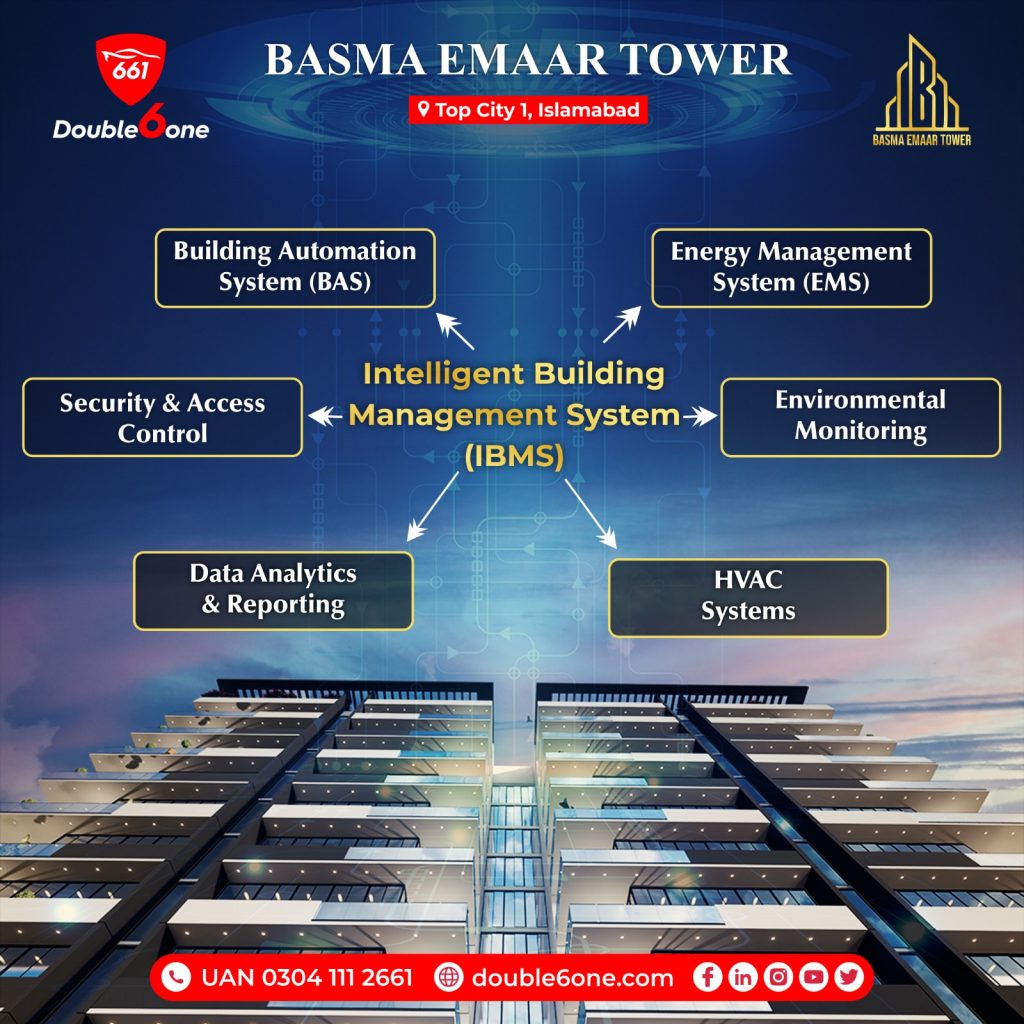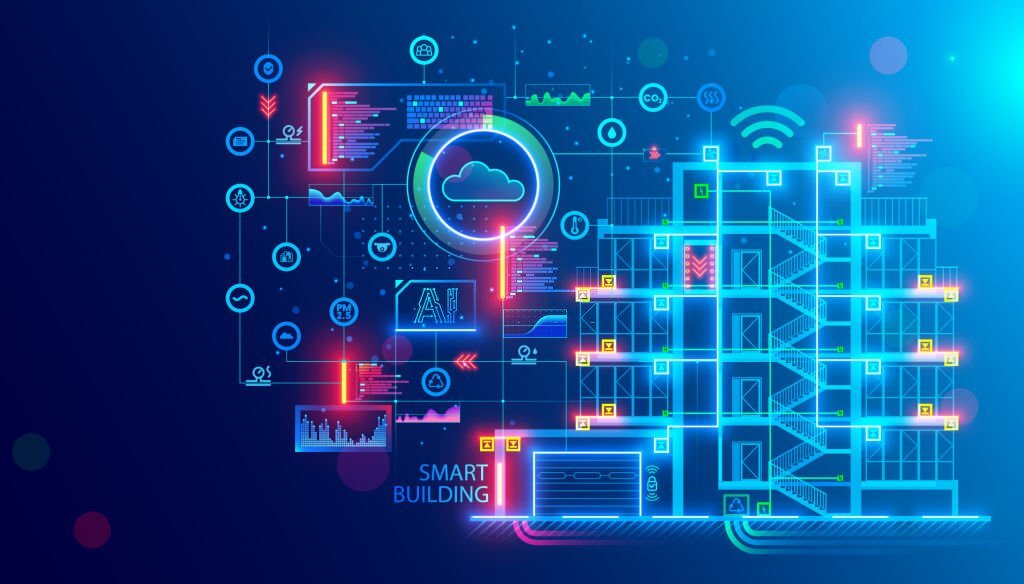
As a building owner or manager, you likely strive to maximize operational efficiency and tenant satisfaction. In today’s world of rapid technological change, smart building technologies offer an opportunity to achieve both goals and gain a competitive advantage. Intelligent, connected systems are reshaping how we design, build, and manage properties. Smart building solutions leverage data and automation to optimize energy usage, improve comfort, enhance security, and streamline facility management.
From smart thermostats to fully integrated building management systems, the range of available smart technologies is vast and growing. However, navigating the options and implementing the right solutions for your needs can be challenging. This article provides an overview of smart building technologies, key benefits, and considerations to help you harness their potential. With smart systems, you can gain insights into how people use your building, identify savings opportunities, address issues proactively, and deliver an unmatched occupant experience. The future of smart buildings is here – it’s time to get on board.
Table of Contents
What Exactly Is a Smart Building?
A smart building utilizes internet-connected technology and automation to intelligently manage and optimize building systems and functions. What exactly constitutes a smart building?
- Integrated Building Systems: Smart buildings integrate major building systems—HVAC, lighting, security, elevators, etc.—into one centralized management system. This allows for optimized performance, remote monitoring, and predictive maintenance.
- Automated Controls: Smart buildings utilize automated controls and sensors to adjust systems based on occupancy, weather conditions, and energy usage. Lights, heating, and cooling will automatically adjust based on whether people are in the space or not. Exterior shades can automatically raise or lower based on the position of the sun.
- Data Collection and Analytics: Smart buildings employ data collection tools and analytics to gain insights into how the building is operating and how to optimize performance. Data from sensors, meters, and building systems are analyzed to improve energy efficiency, reduce costs, and enhance the occupant experience.
- Connectivity and Interoperability: Smart buildings have systems and devices that can connect, communicate, and share data with one another. Open communication protocols allow devices from different manufacturers to work together in an integrated fashion. This interoperability is key to an efficient smart building.
- Occupant Engagement: Some smart buildings provide mobile apps, touchscreens, and other interfaces for occupants to actively engage with the building and tailor conditions to their needs and preferences. Occupants can do things like schedule conference rooms, adjust temperature controls, turn off lights, all from a mobile device.
With integrated and automated systems, data-driven insights, seamless connectivity, and tools for occupant engagement, smart buildings are primed to transform how we design, build, and interact with the spaces we live and work in. The rise of smart buildings is just beginning.
Key Technologies Enabling Smart Buildings
To understand smart buildings, you need to know about the key technologies enabling their capabilities.
There are several core systems that provide smart functionality:
- Building Automation Systems (BAS): Computer-based systems that control and monitor a building’s mechanical and electrical equipment such as ventilation, lighting, power systems, fire systems, and security systems. BAS allow for optimized performance and remote control and monitoring of equipment.
- The Internet of Things (IoT): The network of physical devices and sensors embedded with electronics, software, and connectivity that enable these objects to connect and exchange data. In smart buildings, IoT includes connected sensors, devices, and systems that can communicate with each other and be managed remotely.
- Cloud Computing: Provides a centralized repository for the storage, management, and processing of data gathered from a smart building’s connected systems and sensors. The cloud allows for data aggregation, analytics, and insights that improve building management.
- Data Analytics: The analysis of aggregated data from a building’s connected systems and sensors to gain operational insights and enable predictive maintenance. Analytics help facility managers maximize efficiency, reduce costs, and improve the occupant experience.
- Cybersecurity: With the increased connectivity and data sharing in smart buildings comes a greater need for strong cybersecurity measures like multi-factor authentication, data encryption, and frequent system updates. Robust cybersecurity helps ensure data privacy, integrity and system resilience.
By understanding the technologies that come together to enable smart capabilities, you can appreciate the significant advantages these intelligent buildings offer. The modern technologies may seem complex, but the benefits to both building owners and occupants are very real and tangible.
Top Benefits of Smart Buildings

Increased Energy Efficiency
Smart buildings are equipped with automated systems that can optimize energy usage. Sensors detect occupancy and adjust lighting, heating, and cooling accordingly. Excess energy usage is reduced by automatically turning off systems when spaces are unoccupied. Studies show smart buildings can achieve 20-30% energy savings over traditional buildings.
Improved Comfort and Productivity
Automated temperature controls in smart buildings maintain optimal thermal comfort for occupants. The system detects the number of people in a space and modifies temperatures to suit. Personalized temperature preferences can also be set for improved comfort. Studies show that comfortable indoor environments increase worker productivity by up to 6%.
Enhanced Safety and Security
Smart buildings use a network of sensors and systems to improve safety. Automated fire detection and suppression systems are connected for rapid emergency response. Unauthorized access is prevented through smart locks and security cameras. In the event of a hazardous event, automated systems can lock down buildings and alert emergency responders to expedite assistance.
Reduced Maintenance and Repair Costs
Smart building systems continuously monitor equipment and infrastructure performance. Irregularities are detected early to enable preventative maintenance. Predictive analytics anticipate potential failures before they occur. Automated diagnostics reduce time required to identify and troubleshoot issues. Studies indicate smart buildings experience up to 30% lower repair and maintenance costs compared to traditional buildings.
In summary, smart buildings leverage advanced technologies like automation and analytics to create efficient, sustainable, and livable spaces. While initial costs to upgrade may be higher, the long term benefits to the environment, occupants, and operational costs make smart buildings an investment worth considering. The rise of smart buildings is transforming how we live and work for the better.
Examples of Smart Buildings Around the World
Shanghai Tower, Shanghai, China
The Shanghai Tower is the tallest building in China and the second tallest in the world at 632 meters (2,073 feet) high. Completed in 2015, it incorporates many smart building features, including:
- A double-skin facade that reduces heat gain in the summer and heat loss in the winter. The space between the inner and outer glass curtain walls circulates air to help control the interior temperature.
- Wind turbines and solar panels to generate renewable energy for the building.
- Pneumatic waste collection system that uses air pressure to transport trash through tubes to a central collection point. This reduces waste collection vehicle traffic and emissions.
- Indoor air quality monitoring and purification systems. Air quality sensors regulate the amount of outside air brought into the building and purify the air when pollutants are detected.
- Smart lighting and mechanical systems that can be remotely monitored and controlled to improve energy efficiency.
The Shanghai Tower sets an example for sustainable supertall building design and shows how smart building technologies can be applied on a grand scale. Its innovative systems have earned the building a LEED Platinum certification for sustainability.
The Edge, Amsterdam, Netherlands
The Edge is the most sustainable office building in the world according to BREEAM, the world’s leading sustainability assessment method for buildings. Completed in 2015, the building has the following smart features:
- 15,000 sensors that track occupancy, temperature, lighting, and other factors to improve efficiency. The building systems can adapt to the number of occupants and weather conditions.
- Solar panels, geothermal piles for heating/cooling, and aquifer thermal energy storage. These renewable energy systems generate more than enough energy to power the entire building.
- Automatic blinds that open and close based on the position of the sun to maximize daylight while avoiding overheating.
- Personalized climate control for individual workspaces. Employees can control the temperature using an app on their phone or tablet.
The Edge demonstrates how smart building technologies and sustainable design can be integrated to create an ultra-efficient, human-centric workplace. Its innovative features point to the future of intelligent architecture.
The Future of Smart Buildings
Smart buildings have come a long way in recent years, and the future is bright. As technology improves and costs decrease, smart buildings will become more advanced, widespread, and beneficial.
Increased Automation and Integration
- Building systems will become increasingly automated and integrated, optimizing energy usage and improving occupant experiences. HVAC, lighting, security, and more will be centrally monitored and controlled.
Widespread Adoption of AI and Data Analytics
- Artificial intelligence and machine learning will be broadly implemented in smart buildings. AI will help predict system issues, optimize building operations, personalize occupant experiences, and more. Advanced data analytics will provide building managers with actionable insights.
Focus on Health, Wellness and Productivity
- There will be a greater focus on how smart buildings can promote health, wellness, and productivity. Features may include advanced air filtration and ventilation, circadian lighting that mimics natural light, acoustics that reduce distraction, and sensor networks that can detect building issues impacting occupant well-being.
Seamless Mobile Integration
- Mobile apps will provide a seamless way for building occupants to interface with smart building systems. Apps may allow occupants to do things like adjust temperature and lighting, report issues, reserve shared spaces, and receive notifications about building events or system updates.
The Smart City Connection
- Smart buildings will increasingly be connected to smart city infrastructure. Buildings may share data and integrate with smart energy grids, transportation systems, waste management solutions, and more. This connectivity aims to improve efficiency, sustainability, and quality of life for all city residents.
The future of smart buildings is exciting and transformative. While technology will play an important role, human values like health, wellness, and sustainability will remain at the forefront. Smart buildings are poised to make the spaces we inhabit more responsive, efficient, and beneficial—both now and for generations to come.
Conclusion
As smart buildings become more ubiquitous, their benefits are impossible to ignore. With integrated systems that can automate and optimize building functions, smart buildings offer unprecedented control, connectivity, cost savings, and sustainability. For building owners and managers, the rewards of a smart building are substantial. And for those who live and work within them, smart buildings create environments that are safer, healthier, and more responsive to human needs.
The rise of smart buildings is poised to transform both new construction and retrofits, enabling a smarter, more prosperous and sustainable future for communities around the globe. Though the technology that powers them is complex, smart buildings themselves are designed to simplify and enrich our lives. By embracing smart building technology, you open the door to a world where the places we inhabit seem a little more alive, and a lot more intelligent. The future is smart – and it’s already here.
